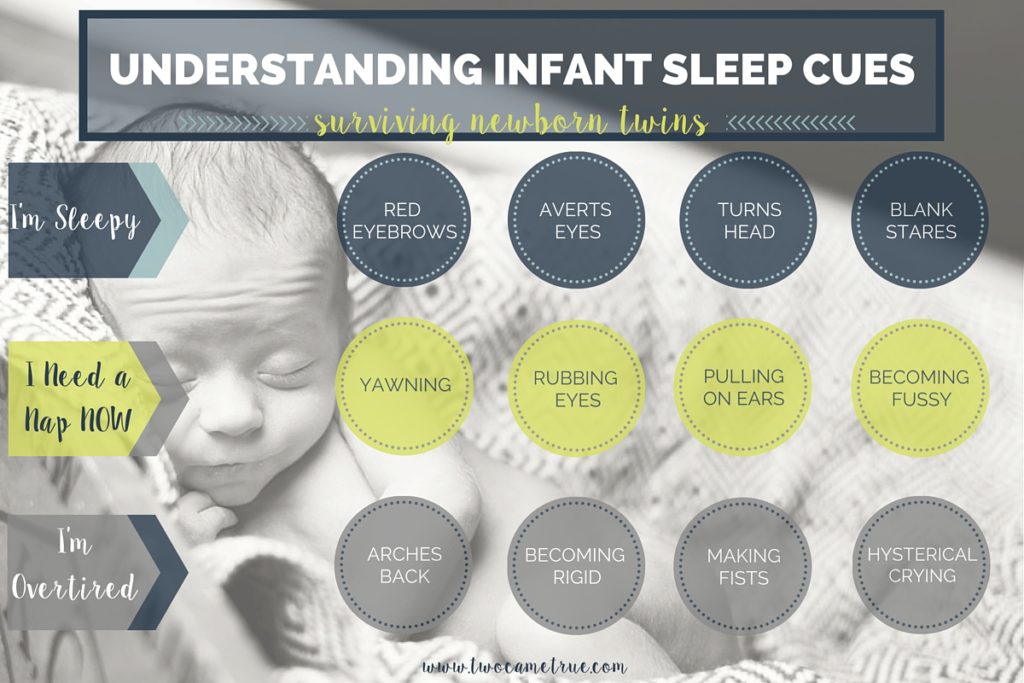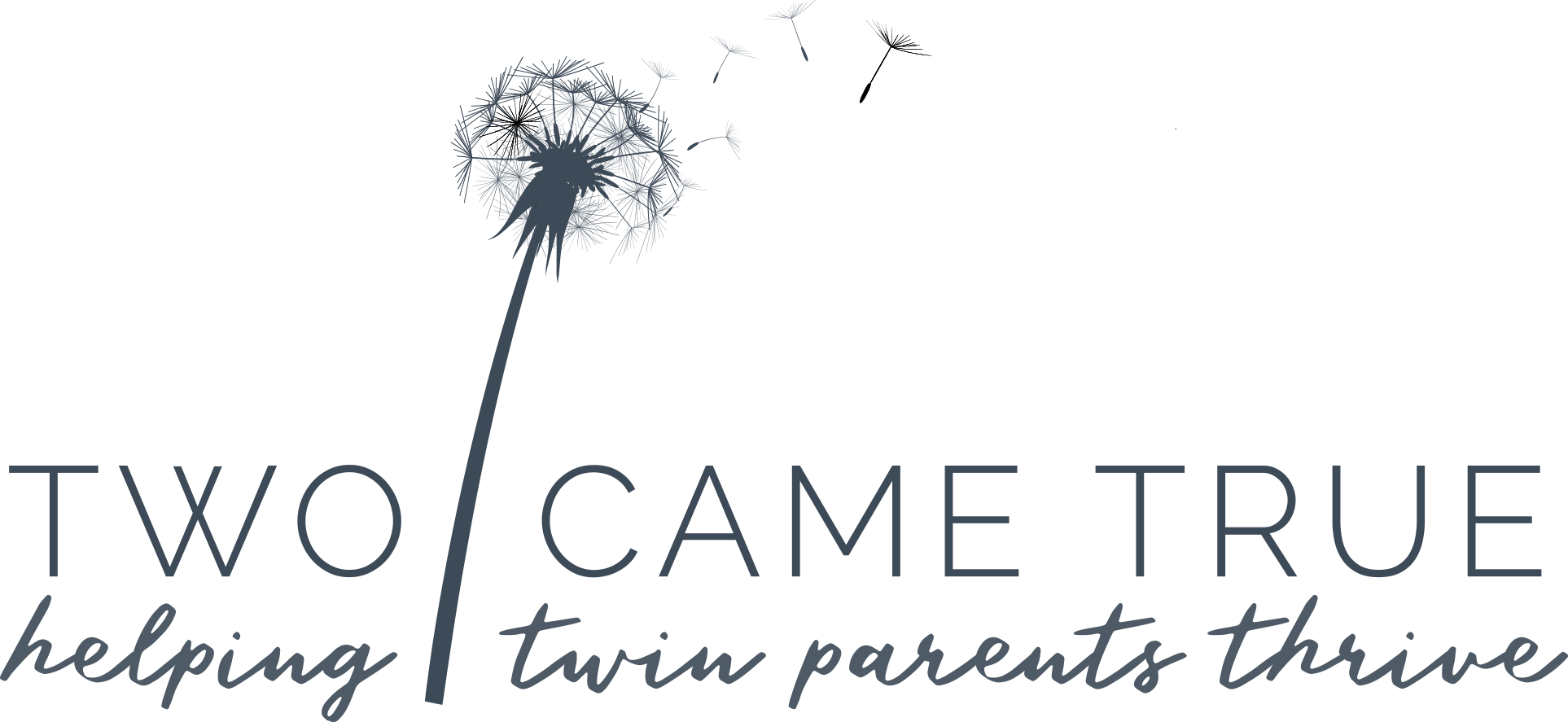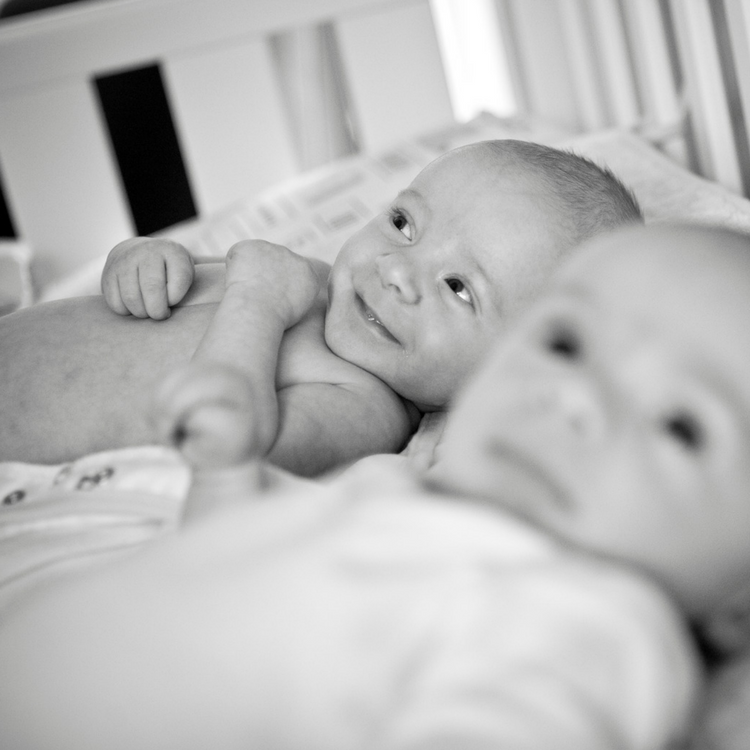 Excited and…EXHAUSTED!
Excited and…EXHAUSTED!
Those two words perfectly describe the first few months at home with newborn twins.
Every soon-to-be parent knows that a lack of sleep comes with the territory of having a new baby, especially when having TWO new babies.
It seems however, that all the preparation in the world doesn’t adequately get families ready for dealing with the reality of infant sleep issues that arise.
Having some basic knowledge of how sleep develops in babies will help troubleshoot issues and will allow your twins AND your family get more zzz’s.
Learning basic facts about newborn sleep probably won’t be a fix-all solution for sleep deprivation, but we hope that having this knowledge may help you to understand and problem-solve the issues you may experience as your twins grow.
What you need to know about infant sleep RIGHT NOW:
Sleep begets sleep —
It seems counter-intuitive, but overtired babies have more difficulties falling asleep and staying asleep.
Sleep allows your babies’ nervous system to calm. When your babies miss out on rest, they are fussy and have a more difficult time dealing with the unpredictability of the world around them.
An overtired baby will need more help settling to sleep and will subsequently wake more often.
If you only remember one thing about infant sleep, remember that sleep begets sleep…well rested babies will typically be better sleepers.
Day vs. Night confusion —
Our circadian rhythm refers to the “internal clock” that we all have, which will signal to our body when it is time to sleep and time to be awake in 24-hour intervals.
Babies “internal clocks” begin to develop in the first few months (usually 2-4). Therefore, parents often find that newborns are sleeping more during the day and are more awake and active at night.
You can help your babies’ develop their circadian rhythm by bringing more natural light and activity into your home during the day.
When bedtime approaches, begin signaling that it is time to sleep with dimmed lights and less noise.
Infant Sleep cycles are short —
The average adult has a sleep cycle of 70-100 minutes. Infants’ cycles are much shorter, typically ranging from 45-60 minutes, which means babies wake up more often.
They also spend 50% of their sleep in light, active (REM) sleep, also causing babies to wake more easily.
When babies wake up during a transition into the next sleep cycle (45-60 minutes into a nap), they probably aren’t done napping/sleeping.
Ideally, your babies should be taking 1.5-2.5 hour naps and typically need 10-12 sleep hours a night. This is not necessarily consecutive, depending on your baby, as nighttime feedings can continue until around 6-9 months of age.
If your babies aren’t yet able to fall asleep independently, they may need you to help soothe them back to sleep to get a complete nap!
Swaddles and white noise are great tools for helping your babies stay asleep and transition between sleep cycles smoothly.
Startle Reflex —
Babies are born with a variety of reflexes. The startle, or moro reflex, helps babies adapt to situations.
Loud noises or the feeling that they are falling may cause your babies to startle, throwing their arms and legs outwards. Unfortunately, the startle reflex can wake a sleeping baby, undoing all the hard work you put into getting them to sleep.
Swaddles and white noise can help babies stay asleep or go back to sleep if the reflex startles them awake.
And luckily, they usually outgrow this reflex between 3-6 months of age.
Sleep Regression —
Just when you thought you had your twins sleeping consistently through the night…
They begin waking up every few hours and you begin to worry that the days of a full night’s sleep are history!
Did they recently learn to roll over, sit up on their own, crawl or walk? Are they getting teeth?
Have you traveled with them or recently gone back to work? Or maybe nursed them back to health after their first cold?
Developmental milestones or changes in routine can cause sleep regression, which means you will have to spend some time re-teaching them the healthy sleep habits they once had.
Remain consistent and employ the strategies that were successful to get your babies’ sleep back on track. Usually, sleep regression in babies only lasts from a few days to a week or so (depending on your twins and the severity of their regression).
Take a breath, pour a glass of wine, and fight through it mama. You’ll get back on track SOON!
Sleep Cues —
One key to helping your twins get to sleep easily is being able to recognize their sleep cues. Overtired babies are harder to get to sleep. Avoid the difficulties of two cranky babies by beginning putting them down to sleep shortly after you see them displaying the early cues. You can find this image (in a printable version) in our FREE RESOURCE LIBRARY by joining our village today! Join us here.

Background image by Penny O. Photography
We know you’re exhausted, but remember….
You won’t be tired forever! Your twins’ sleep patterns will begin to settle around 3-6 months (depending on the baby). Once this begins to happen, they will get to sleep easier and stay asleep longer.
It does get easier!
We want you to feel confident, rested and experience the joys of being a twin mom.
We want you to be making memories with your new family rather than worrying about solving sleep issues that arise.
…so, tell us mama, what sleep issue are you trying to tackle right now with your twins?
Chat with us in the comments. We’ll help you get more sleep!













